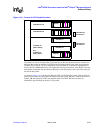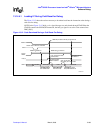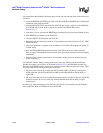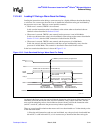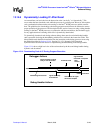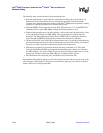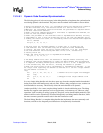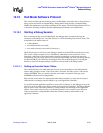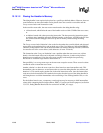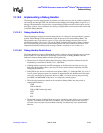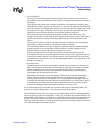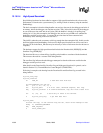
Developer’s Manual March, 2003 13-45
Intel
®
80200 Processor based on Intel
®
XScale
™
Microarchitecture
Software Debug
13.14.5.1 Dynamic Code Download Synchronization
The following pieces of code are necessary in the debug handler to implement the synchronization
used during dynamic code download. The pieces must be ordered in the handler as shown below.
# Before the download can start, all outstanding instruction fetches must complete.
# The MCR invalidate IC by line function serves as a barrier instruction in
#
the 80200. All outstanding instruction fetches are guaranteed to complete before
# the next instruction executes.
# NOTE1: the actual address specified to invalidate is implementation defined, but
# must not have any harmful effects.
# NOTE2: The placement of the invalidate code is implementation defined, the only
# requirement is that it must be placed such that by the time the debugger starts
# loading the instruction cache, all outstanding instruction fetches have completed
mov r5, address
mcr p15, 0, r5, c7, c5, 1
# The host waits for the debug handler to signal that it is ready for the
# code download. This can be done using the TX register access handshaking
# protocol. The host polls the TR bit through JTAG until it is set, then begins
# the code download. The following MCR does a write to TX, automatically
# setting the TR bit.
# NOTE: The value written to TX is implementation defined.
mcr p14, 0, r6, c8, c0, 0
# The debug handler waits until the download is complete before continuing. The
# debugger uses the RX handshaking to signal the debug handler when the download
# is complete. The debug handler polls the RR bit until it is set. A debugger write
# to RX automatically sets the RR bit, allowing the handler to proceed.
# NOTE: The value written to RX by the debugger is implementation defined - it can
be a bogus value signalling the handler to continue or it can be a target address
for the handler to branch to.
loop:
mrc p14, 0, r15, c14, c0, 0 @ handler waits for signal from debugger
bpl loop
mrc p14, 0, r0, c9, c0, 0 @ debugger writes target address to RX
bx r0
In a very simple debug handler stub, the above parts may form the complete handler downloaded
during reset (with some handler entry and exit code). When a debug exception occurs, routines can
be downloaded as necessary. This basically allows the entire handler to be dynamic.
Another possibility is for a more complete debug handler is downloaded during reset. The debug
handler may support some operations, such as read memory, write memory, etc. However, other
operations, such as reading or writing a group of CP register, can be downloaded dynamically. This
method could be used to dynamically download infrequently used debug handler functions, while
the more common operations remain static in the mini-instruction cache.
The Intel Debug Handler is a complete debug handler that implements the more commonly used
functions, and allows less frequently used functions to be dynamically downloaded.



